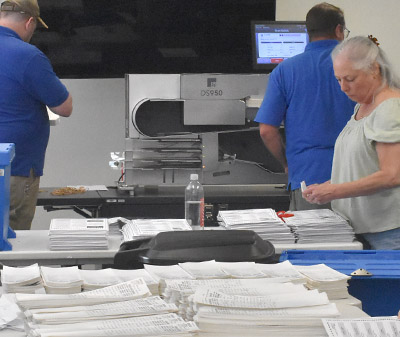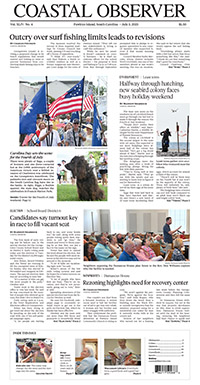Sales tax
Local option tax still short after recount

Georgetown County spent $11,000 to rescan each of the 38,115 ballots cast in the general election only to find the local option sales tax still didn’t pass.
State law requires a recount in elections if the margin is less than 1 percent.
The county rented a machine from Printelect, a North Carolina company that finished the process in a matter of hours.
The referendum placed on the ballot by County Council would have raised the sales tax by 1 cent to fund a property tax credit and provide additional revenue for local government. In the preliminary vote count, the measure failed by just 64 votes.
The margin narrowed to 54 votes three days later, when the county’s Board of Voter Registration and Elections met to certify the results and voted to accept nearly three dozen provisional and fail safe ballots.
Voters fill out provisional ballots for a variety of reasons, including if they requested but did not receive an absentee ballot.
Four more “yes” votes were added after the recount, but it was not enough to change the outcome.
A capital project sales tax referendum was approved by voters by a margin of 754 votes. That was just over 2 percent so no recount was required and the recount didn’t apply to any other races.
Once the ballots were tabulated, the local option tax received 17 more “yes” votes and seven more “no” votes.
Two residents’ provisional ballots were accepted after a poll worker misidentified them.
When Kelly A. Graham arrived at an early voting center, she was told she had already voted. An investigation by Aphra
McCrea, the county elections director, proved that Kelly C. Graham had voted but had been identified incorrectly.
“The poll worker, undoubtedly, didn’t do their due diligence,” McCrea said.
Delbert Johnson was also told he had voted already. McCrea looked at the signature, realized there was an “i” in the first name and tracked down Denise Johnson, who confirmed that she had voted on the second day of early voting, which matched the time and date that the system said Delbert Johnson had voted.
McCrea said during the first three days of early voting, the elections office was “slammed” with people.
“I don’t know if it was out of frustration, or anxiety or nervousness, or if they were attempting to process voters and hurriedly get them down the hall. It was extremely busy and thick in here,” she added. “However, we are supposed to make sure we’re processing the correct voter.”
Nearly half of registered voters in the county cast a ballot during the two-week early voting period.
Delbert Johnson asked the elections board how a poll worker could “confuse” a man and a woman.
“If it was two women, like the woman who had C. Graham and A. Graham, I could understand that,” he said. “But when you’ve got a man, and you’ve got totally different names, nothing at all alike, whenever you scan that driver’s license, how do you make that big of a mistake?”
All four of the votes counted.
Another woman had to vote by provisional ballot because she was not listed among county voters. It turned out she only gave the last four digits of her Social Security number when she registered. When someone with the same last four digits moved to another county, that county took the wrong record.
Provisional ballots were accepted from more than two dozen people who requested an absentee ballot but either did not receive it or changed their mind and showed up at a polling place.
One resident was issued two absentee ballots. She left Georgetown before receiving a ballot, and asked that one be sent to a hotel in Connecticut. After all that she showed up at an early voting center but was given a provisional ballot.
Not all provisional ballots were accepted.
Three people registered after the deadline, two people were not registered anywhere in the state, one person did not have a valid ID, and one person was registered in Florence.
There were also two people who had not voted in several years and were notified that they had to register again but did not.




